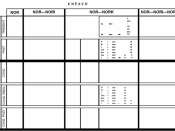Title:Chinese Interference in Learning English Verbs
Mother tongue interference is defined as the use of elements from one's native language while learning a second one. Instances of Chinese interference in English learning can be found at the level of pronunciation, morphology, syntax, vocabulary and meaning.
English and Chinese verbs, although similar in many aspects, have some subtle but significant differences in semantic composition, bringing difficulties to Chinese students in learning English verbs.
1. The semantic composition of verbs
According to Webster's New World Dictionary, a verb is "a word that characteristically is the grammatical center of a predicate and expresses an act, occurrence, or mode of being...". From this definition we can see that the semantic function of a verb is to describe a motion, may it be an act, occurrence, or mode of being.
However, motion itself cannot make up a motion event. There are other elements associated with motion such as direction (as in "take" and "bring"), manner (as in "prance"), aspect (as in "restart") and so on.
All these associative elements, together with motion, constitute a motion complex.
Semantic elements are realized by linguistic structures of various forms. A motion complex is expressed by what we call a verb complex, which comprises the head verb, the particle and the reflection. Since reflection is more concerned with grammar, we will limit ourselves to a consideration of the first two.
Therefore, here we have two sets, as are illustrated in the following:
Set A (motion complex) Set B (verb complex)
motion head verb
manner particle
direction
cause
result
......
Noticeably, these two sets, that is, the semantic composition and its linguistic form, are seldom in one-to-one correspondence. In some cases a motion complex is realized by a single head verb, which is termed incorporation.
e.g. He cupped his...


Not that relevant
I don't think the Chinese words you portrayed in the essay are really that relevant to anything. Plus, a lot of Chinese words are wrong.
0 out of 0 people found this comment useful.